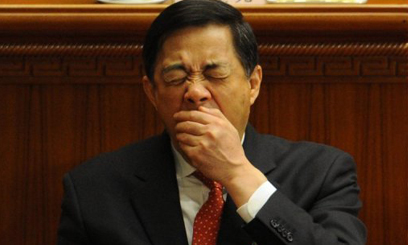In a highly unusual public rebuke, Bo’s removal as party chief of the metropolis of Chongqing was announced a day after Premier Wen Jiabao delivered his strongest call yet for political reform in the country of 1.3 billion people.
The 62-year-old former commerce minister had been seen as one of the leading contenders to join the Communist Party’s Politburo Standing Committee — the apex of political power in China — later this year.
But analysts said that Bo had alienated liberals in the party with his hardline crackdown on corruption in Chongqing, a southwestern city of more than 30 million people.
A populist Maoist revival campaign, which included sending officials to work in the countryside, red sing-songs at state-run firms and patriotic television shows, also raised hackles.
Bo’s political future was plunged into doubt last month when Wang Lijun, the former Chongqing police chief who ran the corruption crackdown, visited a US consulate and reportedly asked for asylum.
Wang has now been placed under investigation. But experts said Bo, the ambitious son of a Communist revolutionary who joined the 25-member Politburo in 2007, had sown the seeds of his downfall long before the latest scandal.
“He annoyed a lot of powerful people with his anti-corruption campaign, while his red songs set him against all the liberals, so all in all, he made a lot of enemies,” said one Western diplomat who asked not to be named.
Academic Guo Yingjie said the move against Bo may indicate a power struggle between the conservative faction of the Communist Party and the liberals, represented by Wen and President Hu Jintao.
Hu, Wen and five other leaders are due to relinquish their positions on the Standing Committee — China’s top decision-making body — this autumn, before resigning their government positions in March 2013.
Vice president Xi Jinping, who is tipped to replace Hu next year, and Vice Premier Li Keqiang are expected to be the only current members of the standing committee who will stay on and it remains unclear who will get the other posts.
“I think Hu Jintao and Wen Jiabao are sending a signal to Xi Jinping so he doesn’t steer towards the left too much,” said Guo, associate professor of Chinese Studies at the University of Technology in Sydney.
Guo said the move to dismiss Bo appeared to favour his long-time political rival Wang Yang, the reformist party leader of the southern province of Guangdong and a front-runner for a place on the Standing Committee.
“My guess is that Wang Yang will get into the Standing Committee quite easily as a result of this,” he said.
On Wednesday Wen, delivering his final press conference before he bows out as premier, said officials must “learn lessons” from the Wang Lijun incident, comments seen as a public rebuke of Bo.
Wen also warned of a repeat of the disastrous Cultural Revolution if China failed to implement “urgent” political reforms — his strongest call yet for change in the one-party state.
Some analysts saw the reference to the Cultural Revolution — a decade of chaos launched by Mao Zedong to bring down what he perceived as “capitalist” forces — as a criticism of Bo’s campaign to revive Maoist ideology.
Bo’s father Bo Yibo was a revolutionary who fell from grace and was imprisoned and tortured during the turbulent 1966-1976 period. Bo Xilai himself spent time in a labour camp, and his mother was beaten to death.
When Mao died and reformist leader Deng Xiaoping took over, Bo Yibo was rehabilitated and became one of the most powerful men in China, bestowing on his son an impeccable family pedigree that had protected him until today.
However Patrick Chovanec, a professor at Beijing’s Tsinghua University, said Bo’s open ambition and charismatic style had “made a big chunk of the leadership very uncomfortable”.
“They found his whole style of campaigning for a Standing Committee position to be offensive,” he told AFP.
“He’s very open, very confident, very charismatic and that’s not the way most Chinese leaders behave and that is not the way they feel comfortable with their peers behaving.”
Bo has been replaced as Chongqing party secretary by vice-premier Zhang Dejiang, according to a brief statement posted on a government website that gave no reason for his dismissal.










































